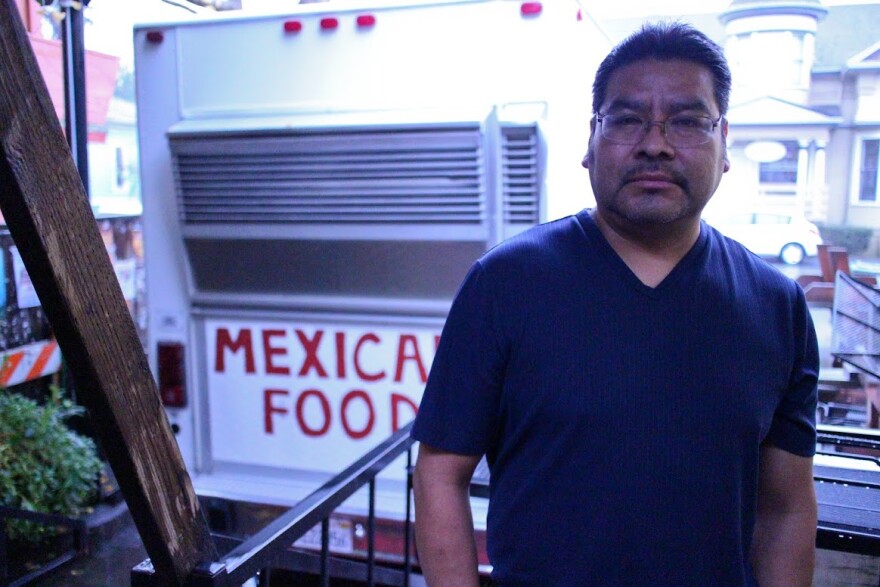They have names like Curry Up, Burger She Wrote, and Dogzilla.
They serve wild boar, plantains, and sea-salted this and caramelized that.
They’re in converted airstreams, school buses, even ambulances, with some being solar powered and others fueled by vegetable oil.
They are food trucks, and they’re now estimated to be a one-billion-dollar industry in this country. But for Esteban Gonzalez it started with about $66.
Esteban Gonzales: "When I decided to do something for my family I just gave 1,000 pesos. The bus charge me from Mexico to Tijuana 700 pesos. And all I got is 300 pesos. So what I do is I just buy three pounds of tomatoes and a little package of salt and from Mexico City to Tijuana I just eat tomatoes."
Esteban was 20. His dad had died when he was seven. He had never been to school and could not write his own name.
Esteban Gonzales: "I work in Tijuana for a month, live in the streets, then when I get almost $500, I hire somebody - like coyotes - to help me across the border."
Esteban made his way to Humboldt County where he had relatives. His goal was to become financially independent, get citizenship, and bring his wife and children over from Mexico.
Esteban Gonzales: "One day I decided to buy my own house so I get three jobs: work in the sawmill, milking cows, and working for Eel River Brewing in Fortuna as a dishwasher. So three jobs in one day."
He got the house but his back didn’t hold out. And this led Esteban to that West Coast icon: long before the hipster food truck there was - The Taco Truck. He put $1,500 down on a $50,000 used truck.
At first he made ten dollars a day, then 80, then enough to add a second truck, and now he has a brick and mortar restaurant that serves as the central kitchen and his wife and kids help at all three locations.
Esteban Gonzales: "I start at 5:30 in the morning to cook everything, prepare everything for the three businesses. And then I'm open from 11 to 8 but I have to get ready for the next day. So I have to clean and it takes me two hours. So 5:30 to 10 every day."
Customer: “Can I get one chicken taco with medium salsa?”
Edith Gonzales: "Sure … That will be $2.25."
Edith is 26, the second of Esteban’s four children, and started working La Chiquita Taco Truck when she was 13. She says she made some bad choices as a teenager but rebounded with the help of her mom. Her dad was always working.
I ask her what matters most in her life.
Edith Gonzales: "To keep my relationship with my dad and my mom. And for them to keep their business still. Probably some day me taking care of them. When they get old."
Esteban’s taco trucks are now 15 years old, the restaurant three years old, and it’s been 26 years since he crossed the border. He and his family are now part of a food truck industry that has grown over 200-percent in the past 4 years. Currently, one out of four vendors specialize in Latino cuisine.
I ask Esteban how he learned English.
Esteban Gonzales: "Customers. Because every time when they come over here they ask me, "I want a Super Veggie without dairy. And I ask them, What is 'dairy?' What does this mean, 'dairy'? Yo no se - I don't know. 'Dairy is no queso and no creme.' Oh! No dairy! But my customers teach me."
Then I ask where he learned to cook.
Esteban Gonzales: "Just call my mother. She is in Mexico. 'Hey, how do you cook those beans? Hey, how do you cook this meat? Hey, how do you make this molé?' 'Oh, put this and do this and do that.'"
And then I ask myself what can I learn from Esteban? What wisdom can he share after going from homeless in the streets of Mexico City to running a successful business on this little corner in Arcata.
Esteban Gonzales: "I try to keep going and keep going. And like my mother told me: don’t ever look behind your back. Never give up right. Always look in front, no matter what."
Esteban became a citizen in 1993. His longest vacation since coming to the US was back in 2000. It lasted 5 days.


